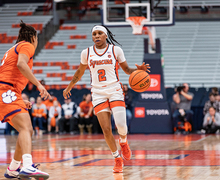Hookup culture hasn’t liberated us — yet
Sarah Allam | Illustration Editor
Apps are free to facilitate easy hooking up, but they should encourage users to respect and engage their sexual partners, not disregard them, and they need to take a stand against discrimination.
“Hookup culture” is a term that gets tossed around by everyone from the bitterest baby boomers to the most progressive Generation Z kids. This culture of normalized casual sex, often fueled by dating apps, is prevalent across college campuses.
Certain dating apps like Tinder and Bumble are even recruiting student ambassadors on college campuses, and features like TinderU specifically cater to the college experience.
Students could easily think that a culture that embraces casual sex, including sex outside relationships and sex with multiple partners, is synonymous with a sexually liberated culture. Yet despite its promise of liberation, hookup culture often fails to live up to that ideal.

Karleigh Merritt-Henry | Digital Design Editor
Often, this so-called liberated culture is just as guilty of policing and objectifying women’s sexuality as the days of worshipping virginity and celibacy until marriage. And our generation is hardly the first to try to cultivate such a culture.
“We have this conversation around hookup culture that talks about it as somehow detached from the free love movements of the past 50 years,” said Charisse L’Pree, an assistant professor of communications at the S.I. Newhouse School of Public Communications.
In fact, what has brought about our new conversation surrounding hookup culture may not be so much that the concept of sexual liberation is new, but rather that we have many new forms of connecting with others, mainly because of apps designed specifically to make hooking up easier.
L’Pree said hookup apps can actually make hooking up safer and give people more power over their choices.
“What I’m talking about right now with hookup apps is the potential,” she said. “The potential is, we can make decisions in a safer mindset, we can have conversations about consent before we get all hot and heavy, we can have conversations about consent before we even start drinking.”
That potential is often marred by interpretations of casual sex that cast women as a prize to be won, a conquest, which is hardly liberating. This commodification of sex and dating, along with the robotic and artificial nature of premeditated messages, is a far cry from the free-love ideas of the sixties. And really, how satisfying can a hookup be when we’re treated like numbers in a game?
L’Pree recalled witnessing that numbers-game approach to sex. “He’s sitting there on Tinder, he’s doing something else, and he was on his phone and just swiping right,” L’Pree said. “Like, not even paying attention, just ‘if I accept all of these women, then they’re the limiting factor.’ And it was just really shocking to me.”
People and their bodies deserve respect, and disrespect can quickly become discrimination. It’s not uncommon for people to list so-called “preferences” in their dating app bios, setting weight limits and even telling people of a certain race not to interact with their profile.
Apps are free to facilitate easy hooking up, but they should encourage users to respect and engage their sexual partners, not disregard them, and they need to take a stand against discrimination.
“That’s the potential of apps, to really cater to hookup culture and encourage healthy, safe hooking up,” L’Pree said. “But that’s not what the apps do. The apps, in my opinion, are simplistically designed just to make connections, not to be able to have the in-depth conversation that needs to happen when you want to be physically and emotionally intimate with other people.”
Our society’s view of sex will only become liberating when people of all genders and sexualities feel comfortable engaging in sex, no matter how much or how little of it they desire. If we want to truly realize the goals of the sexual liberation movement started so many decades ago, we need to stop telling people to hook up and engage in casual sex or stay committed and monogamous.
We need to empower one another to make the choices that are best for us as individuals. Hookup and dating apps can help facilitate the conversations and interactions we need to promote consent, respect and understanding of who you’re hooking up — or not hooking up — with.
Mallory Stokker is a junior magazine journalism major. Her column appears bi-weekly. She can be reached at [email protected]. She can be followed on Twitter @_malloryyrose_.
Published on September 11, 2019 at 12:17 am




